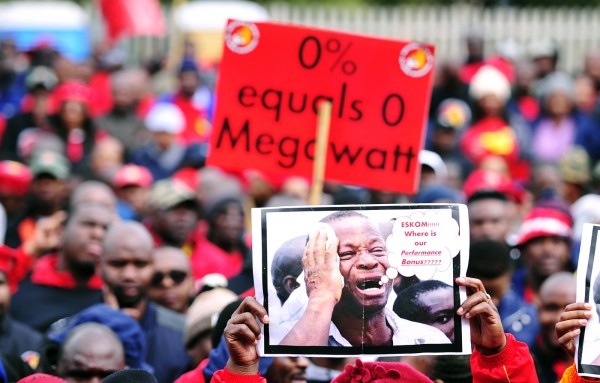After a month of wage negotiations with the state-owned power utility of South Africa, Eskom, three unions representing the workers, the National Union of Metalworkers of South Africa (NUMSA), National Union of Mineworkers (NUM) and Solidarity, took the recent offer by the company of a 6.2% wage hike for the first year to their members. However, the workers rejected this proposal, and demanded a living wage.
Despite ideological differences, (NUMSA was expelled in 2014 from the Congress of South African Trade Unions (COSATU) an alliance partner of the ruling party, the African National Congress; NUM is part of COSATU) unions throughout the negotiation process put up a united front in advancing the interests of workers.
When workers demanded an increase of their wages, Eskom pleaded poverty and declared that there would be a 0% wage increase because of financial difficulties the state-owned enterprise is facing. “This so-called 0% increase is a wage-freeze, which is anti-worker and Thatcherism at its best. That is why we remain resolute that workers be given their deserved wage increases” read a NUMSA statement.
Eskom is struggling to service its debt. IMF and the World Bank are some of the creditors it is indebted to. The stagnation of wages is perceived by some, particularly unions, as an implementation of the right-wing policies of these supra-international institutions. The state utility, according to reports, has also wasted billions through mismanagement and corruption.
As negotiations reached a deadlock on June 7, unions alleged that the negotiating conditions were hostile towards them, and that Eskom was negotiating in bad faith with no intention of resolving the problems faced by the workers.
Despite being barred from striking by the Labour Relations Act – Eskom’s functions fall under essential services – on June 14, workers protested the 0% increase across the country, most notably at Megawatt Park near Sandton. The 0% increase and adverse attitude of Eskom at negotiations was seen as provocative and insulting towards workers by unions.
Rejecting the 0% increase, NUMSA General Secretary Irvin Jim sad in a press statement that the workers could not be victims of a crisis they did not create. Looting by the executive had brought the utility to a financial crisis and workers could not be the victims of that. In a joint press statement on June 12, the unions echoed Jim’s view that “it is unfair for workers to be punished for the reckless decision of government as a shareholder, and the Eskom board and Eskom management.”
The June 14 protest, and the breaking down of negotiations led to the Minister of Public Enterprises, Pravin Gordhan, to intervene with the aim of resolving the impasse between the unions and Eskom.
The state-owned enterprise moved from the 0% increase to a 4.7% hike which subsequently changed to a different percentage that workers rejected on the basis that the state had adopted an anti-working class budget that adversely affected the poor through high Value Added Tax and skyrocketing petrol prices.
Going into Wednesday’s negotiations, the unions presented a consolidated wage demand with two options. The first one involved an 8% wage increase and improved allowances, including a housing allowance of 500 rands and bonuses promised by the Eskom group CEO for the workers.
The second option for the state-owned enterprise presented by the workers was a three-year agreement, with an 8% wage increase for 2018, and an 8.5% rise for 2019 and 2020 respectively. The workers also wanted the payout share of 12% of for workers to increase to 25%.
However, the position of both unions and Eskom is uncertain. The unions have requested a meeting with the Eskom board and the ministers of Finance and Public Enterprises as the negotiations have reached a sensitive stage.





